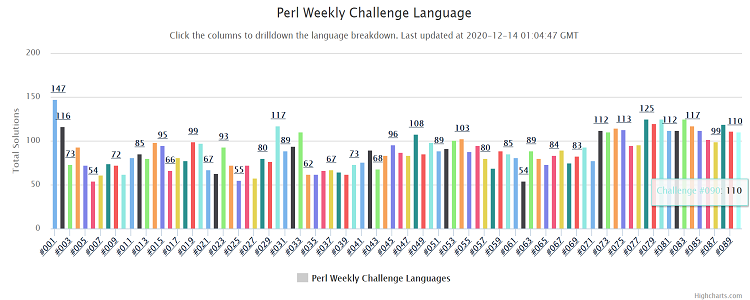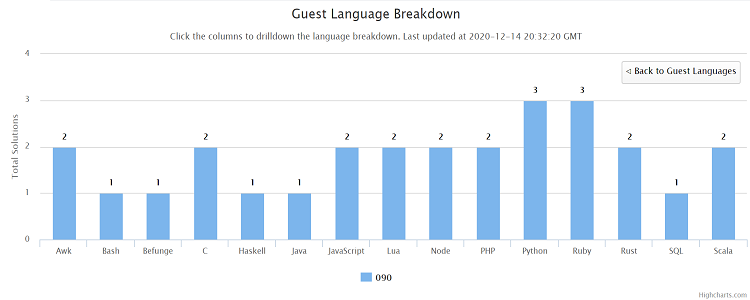TABLE OF CONTENTS
1. HEADLINES
2. ADVENT CALENDAR
3. RECAP
4. PERL REVIEW
5. RAKU REVIEW
6. CHART
7. NEW MEMBERS
8. GUESTS
9. TASK #1: Count Number
10. TASK #2: Jump Game
HEADLINES
We have 3 new members joining the Team PWC this week, Garrett Goebel, Mihail Iosilevitch and Mohammad Meraj Zia. It became even more special as a very close and dear friend Mohammad Meraj Zia finally joined the team.
Colin Crain back in action again after the short break.

This week, we had 27 contributions by guests in 15 different languages. I would like to THANK each and every guest contributors.

While we are talking about contributions, lets share some interesting stats from the GitHub repository.
1) Commits: 12,280 (+206)
2) Pull Requests: 2,978 (+49)
3) Contributors: 151 (+2)
4) Fork: 191 (+3)
5) Stars: 85
Last but not the least, I would like to thank each and every member for their support and encouragement.
ADVENT CALENDAR
This week, I could add three more days i.e. Day 5, Day 6 and Day 7 to the Advent Calendar 2020.
Day 1: Octal Number System / Balanced Brackets by Jaldhar H. Vyas.
Day 2: Make it $200 by Ryan Thompson.
Day 3: LRU Cache by E. Choroba.
Day 4: GCD Sum by Andrew Shitov.
Day 5: Invert Tree by Dave Jacoby.
Day 6: Bit Sum by Luca Ferarri.
Day 7: IPv4 Partition by Javier Luque.
RECAP
Quick recap of the “The Weekly Challenge - 090” by Mohammad S Anwar.
PERL REVIEW
Please checkout Perl solutions review of the “Perl Weekly Challenge - 088” by Colin Crain.
If you missed any past reviews then please checkout the collection.
RAKU REVIEW
If you missed any past reviews then please checkout the collection.
CHART
Please take a look at the charts showing interesting data.
I would like to THANK every member of the team for their valuable suggestions. Please do share your experience with us.
NEW MEMBERS
1) Garrett Goebel, Raku hacker from Atlanta, Georgia, United States.
2) Mihail Iosilevitch, Raku hacker from Russia.
3) Mohammad Meraj Zia, Java hacker from London.
Please find out How to contribute?, if you have any doubts.
Please give it a try to an excellent tool EZPWC created by respected member Saif Ahmed of Team PWC.
GUESTS
1) Abigail shared solution to Task #1 in Awk.
2) Abigail shared solution to Task #1 in Bash.
3) Abigail shared solution to Task #1 in Befunge.
4) Abigail shared solutions to Task #1 and Task #2 in C.
5) Abigail shared solutions to Task #1 and Task #2 in Node.
6) Abigail shared solution to Task #1 in Python.
7) Abigail shared solution to Task #1 in Ruby.
8) Abigail shared solution to Task #1 in SQL.
9) Henry Wong shared solutions to Task #1 and Task #2 in PHP.
10) Laurent Rosenfeld shared solutions to Task #1 and Task #2 in Scala.
11) Mohammad Meraj Zia shared solution to Task #2 in Java.
12) Nuno Vieira shared solutions to Task #1 and Task #2 in JavaScript.
13) Pete Houston shared solution to Task #1 in Awk.
14) Roger Bell_West shared solutions to Task #1 and Task #2 in Python.
15) Roger Bell_West shared solutions to Task #1 and Task #2 in Ruby.
16) Roger Bell_West shared solutions to Task #1 and Task #2 in Rust.
17) Tyler Wardhaugh shared solutions to Task #1 and Task #2 in Lua.
18) Ulrich Rieke shared solution to Task #1 in Haskell.
Please find out past solutions by respected guests. Please do share your creative solutions in other languages.
TASK #1 › Count Number
Submitted by: Mohammad S Anwar
You are given a positive number $N.
Write a script to count number and display as you read it.
Example 1:
Input: $N = 1122234
Output: 21321314
as we read "two 1 three 2 one 3 one 4"
Example 2:
Input: $N = 2333445
Output: 12332415
as we read "one 2 three 3 two 4 one 5"
Example 3:
Input: $N = 12345
Output: 1112131415
as we read "one 1 one 2 one 3 one 4 one 5"
TASK #2 › Jump Game
Submitted by: Mohammad S Anwar
You are given an array of positive numbers @N, where value at each index determines how far you are allowed to jump further.
Write a script to decide if you can jump to the last index. Print 1 if you are able to reach the last index otherwise 0.
Example 1:
Input: @N = (1, 2, 1, 2)
Output: 1
as we jump one place from index 0 and then twoe places from index 1 to reach the last index.
Example 2:
Input: @N = (2,1,1,0,2)
Output: 0
it is impossible to reach the last index. as we jump two places from index 0 to reach index 2, followed by one place jump from index 2 to reach the index 3. once you reached the index 3, you can't go any further because you can only jump 0 position further.
Last date to submit the solution 23:59 (UK Time) Sunday 20th December 2020.
